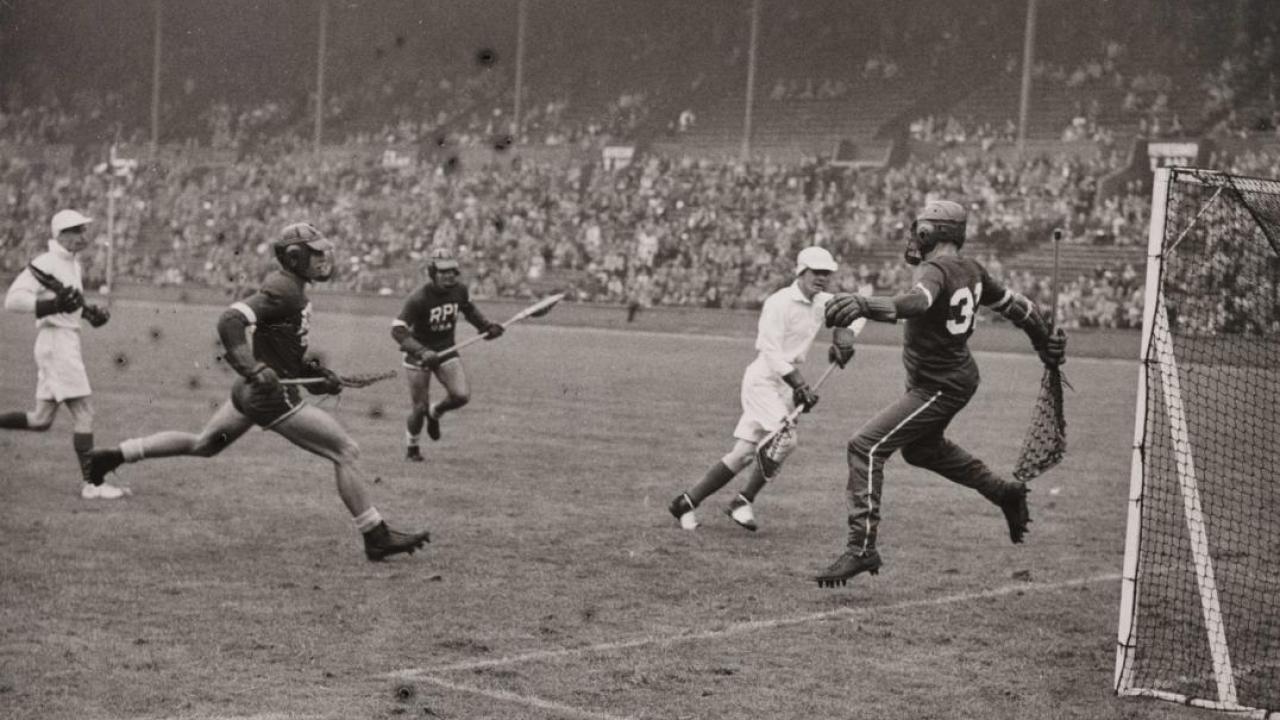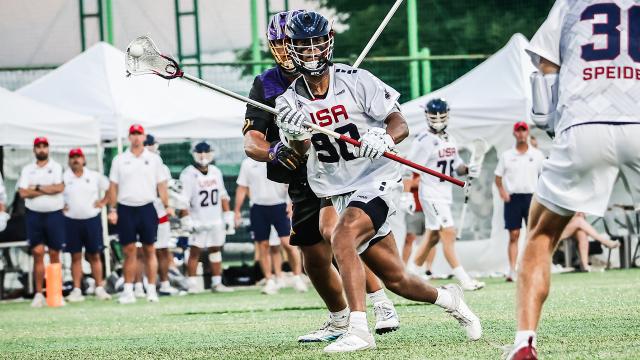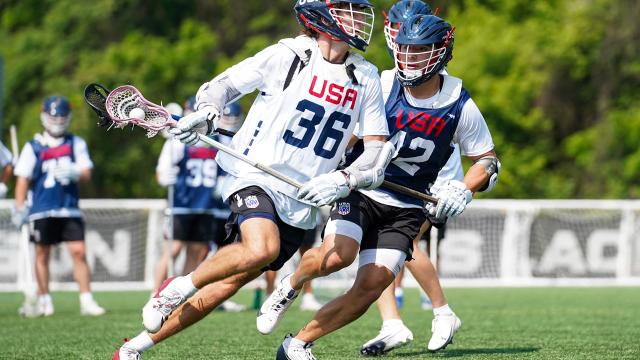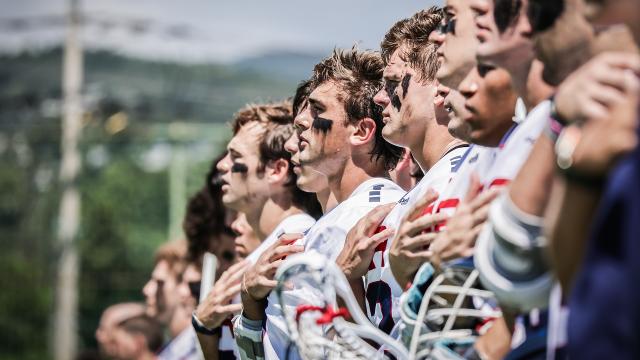
Remembering the 1948 U.S. Olympic Lacrosse Team
When lacrosse returns to the Olympic Games in 2028, it will be the first time since 1908 that lacrosse appears as an official Olympic sport.
However, the sport does have a history with the Olympic Games beyond that year. Lacrosse appeared in multiple Olympics as a demonstration sport — usually native to the host country included to promote its appeal — in 1928, 1932 and 1948.
This is the story of the 1948 RPI lacrosse team, the last to represent the United States in the Olympic Games. Compiled from archives and interviews with living members of the team at the time of its publication Aug. 31, 2016, we are republishing this article in light of Monday’s news.
IT HAD BEEN THREE YEARS SINCE WORLD WAR II ENDED. Ned Harkness, then 27 years old, had coached just four games at Rensselaer Polytechnic Institute before the Pearl Harbor attack in 1941, but he quickly turned a group of inexperienced players into a national contender.
After just three full seasons, RPI was on top of the lacrosse world. It finished the 1948 season with a 13-0 record, averaging 13 goals per game and scoring wins over Yale, Syracuse and Virginia.
During the season, it was announced that lacrosse would join Swedish ling, a form of gymnastics, as a demonstration sport at the London Olympics, and RPI got the nod to represent the U.S. and became the first team to travel to England since Syracuse in 1923.
Just four years young, the RPI men’s lacrosse program raised some $20,000, via fundraisers at home games, to fund the trip to the Olympics, part of an eight-game tour against the top teams in England. Efforts at RPI’s matchup with Virginia raised a hefty $5,000. There were separate events like pie-eating contests.
The 30 players took a bus from Troy, N.Y. to New York City and set sail across the Atlantic aboard the Marine Flasher, headed for Marrie Oulde, England, as fans held up a sign that read “Your Troy rooters wait to read more winning box scores.”
The team slept in bunks six beds high and brought 875 pounds of canned goods for the trip. Food was scarce and conditions in a post-war England were harsh enough to warrant a debate as to whether the London games could even go on.
RPI’s tour got started in Manchester on July 15, 1948 — a 17-0 win in front of 7,000 spectators. Attackman Dick Powell scored four goals. It was a night game against Owens College and fans shouted “‘Go Owens!” whenever players had the ball.
“‘Who’s covering Owen?’” Harkness shouted at his team as the game progressed.
Only later did teammates Bill Coleman and Art Beard find out there was no Owen, but they had just beaten Owens. It was a precursor to the fun that RPI had throughout the trip.
Players bought kilts and other souvenirs. They rode bikes through the streets on off days. After games, both teams ate dinner together, with coaches and players giving speeches along the way. It had a lasting impact on many that took part.
“[The English hospitality] always struck him as something big when he was raising us,” said Christopher Davis, son of RPI team member Martin Davis. “When it came to sports, that was very important in how he raised us.”
The U.S. team rallied off five more victories by a combined score of 56-10 against local all-star teams. The margin of victory was slightly surprising to the team, given that it was playing under English lacrosse rules that included limited substitutions, a 120-yard field and 12 players on the field at a time.
RPI took a 7-0 record into its much anticipated matchup with the All-England team at Wembley Stadium on August 5. It had played in front of as many as 15,000 fans during the trip, but players knew this game would be different.
Beard, Coleman and their team were accompanied by “scouts” who ushered them under the stadium, into the training room and through the tunnel heading to the field. Coleman heard the full stadium of over 35,000 fans (some reports state 80,000) roar as he stepped onto the field and felt the sun beam down on him.
The U.S. team wore dark jerseys with “RPI” emblazoned in white and “USA” directly under it. The All-England team played in all white, including baseball hats with flaps that differed from the padded helmets that the U.S. used.
Just like the games that preceded it, RPI jumped out to an early lead. Alan Myers (two goals), Bill Coleman and Robert Wood combined for four goals to give the U.S. team a 4-2 lead after one quarter.
Then, the game stopped suddenly. Coleman couldn’t believe what he was seeing — the royal entrance.
“Everything stopped and the King and Queen arrived in their box,” Coleman, now 92, said. “It was George VI and his daughter Elizabeth II. ... We were all shocked that they stopped in the middle of everything and stood at attention while the King and Queen arrived. That was quite an experience for us.”
Whether motivated by royalty, the All-England team answered back. In fact, it scored three straight goals bridging three quarters to take a 5-4 lead late in the game. The U.S. midfield was tiring.
“We were all fresh runners,” Beard, 90, said. “But for some reason during the Olympics, they decided to not allow substitutions except one each quarter. So that slowed our midfield down somewhat. ... That kind of wore us down.”
There wasn’t time to decide a winner, as no one budgeted overtime into the Olympic schedule. Still, according to Davis, all players got a bronze first-place medal as a reward for putting on the game.
Harkness and his RPI team finished the trip 7-0-1 and many of them sailed home on the Marine Falcon and returned August 21 to a campus that was starting to fall for lacrosse. The trip made a lasting impression of everyone who participated.
“It was a great time and we did very well throughout the country,” Beard said. “... It was quite an experience for all of us. There were a few fellows that were in the service and went to Europe in the war, but the rest of us weren’t. It was a great time in England.”
The memories from 1948 remain after almost 70 years, and the sport is pushing to create more. If lacrosse ever becomes an official Olympic sport, it’ll give players a chance to captivate a nation, and show the game to the world, just like 30 college kids did in 1948.
Matt Hamilton
Matt Hamilton is the Content Marketing Manager at USA Lacrosse, having served as a staff writer for four years. He's a Baltimore native who loves the Orioles and Ravens, even if they let him down in the last year. He likes chicken tenders and Shirley Temples and sick views. He also loves writing about lacrosse.

Categories
Related Articles




